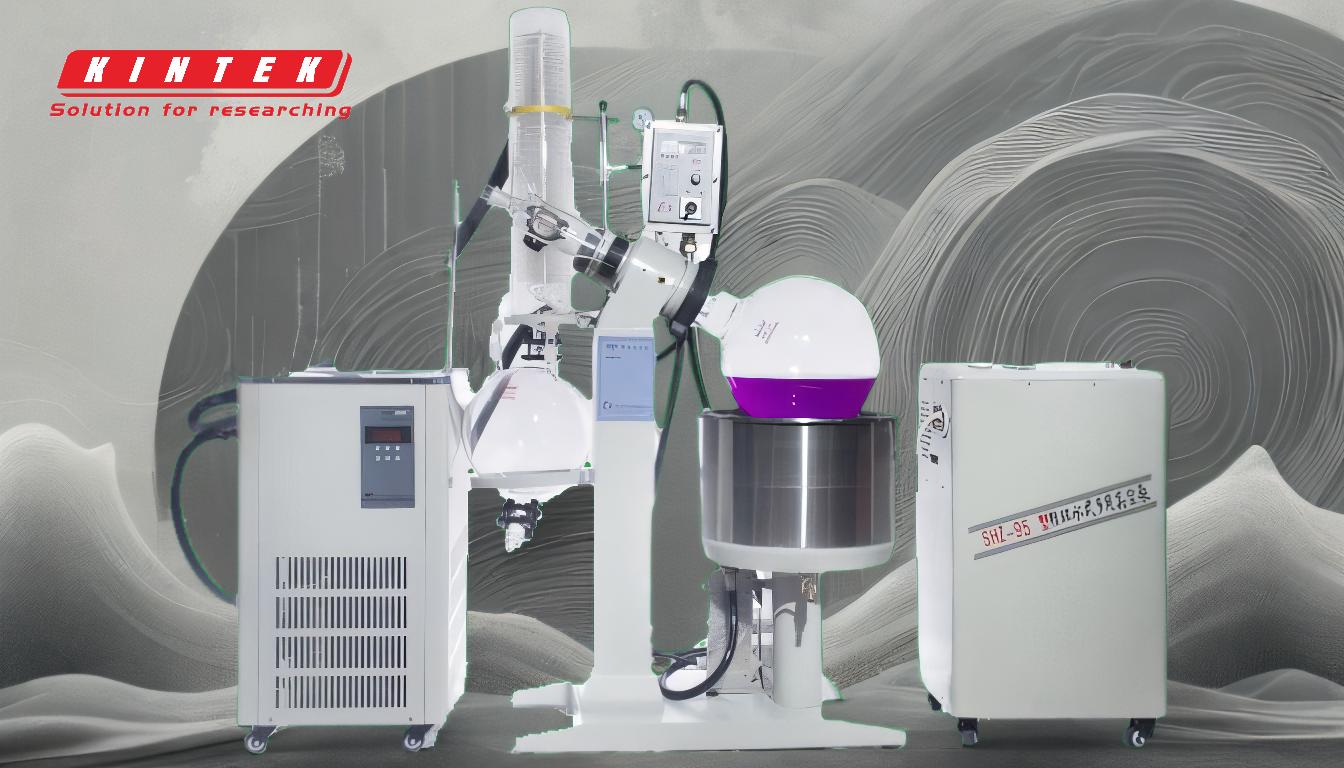A rotary evaporator, or rotavap, plays a crucial role in organic synthesis by enabling the efficient and gentle removal of solvents from samples through evaporation. This process is essential for concentrating samples, isolating compounds, and preventing unwanted side reactions such as oxidation or decomposition. By operating under reduced pressure, rotary evaporators allow solvents with high boiling points to evaporate at lower temperatures, preserving the integrity of the sample. This makes them indispensable in organic synthesis, where precise control over reaction conditions and solvent removal is critical.
Key Points Explained:

-
Efficient Solvent Removal:
- Rotary evaporators are designed to remove solvents from samples quickly and effectively. This is particularly important in organic synthesis, where solvents are often used to dissolve reactants and products. After a reaction, the solvent must be removed to isolate the desired compound.
- The process involves rotating the sample flask to increase the surface area of the solvent, which accelerates evaporation. The reduced pressure in the system lowers the boiling point of the solvent, allowing it to evaporate at a lower temperature.
-
Gentle Evaporation:
- One of the key advantages of rotary evaporation is its ability to gently remove solvents without exposing the sample to high temperatures. This is crucial for heat-sensitive compounds that might degrade or undergo unwanted side reactions at elevated temperatures.
- By operating under vacuum, the boiling point of the solvent is reduced, minimizing the risk of thermal degradation.
-
Prevention of Side Reactions:
- In organic synthesis, high temperatures can lead to side reactions such as oxidation, decomposition, or polymerization. Rotary evaporators mitigate this risk by allowing solvents to evaporate at lower temperatures.
- This is particularly important when working with complex organic molecules that are sensitive to heat or reactive with oxygen.
-
Concentration of Samples:
- Rotary evaporators are widely used to concentrate samples by removing excess solvent. This is a common step in organic synthesis to isolate and purify reaction products.
- The ability to concentrate samples under controlled conditions ensures that the desired compound is obtained in a pure and concentrated form.
-
Fractionation and Separation:
- In some cases, rotary evaporators are used for fractionation, where different components of a mixture are separated based on their boiling points. This is achieved by carefully controlling the temperature and pressure during evaporation.
- Fractionation is useful in organic synthesis when dealing with mixtures of compounds that have different volatilities.
-
Versatility in Applications:
- Beyond organic synthesis, rotary evaporators are used in various fields, including molecular cooking, where they are employed to prepare extracts and distillates. This versatility highlights the importance of rotary evaporation in both scientific and culinary applications.
- In organic laboratories, rotary evaporators are a standard piece of equipment for solvent removal, sample concentration, and compound isolation.
-
Controlled Environment:
- Rotary evaporators provide a controlled environment for solvent removal, with precise regulation of temperature, pressure, and rotation speed. This level of control is essential in organic synthesis to ensure reproducibility and consistency in experimental results.
- The ability to fine-tune these parameters allows chemists to optimize the evaporation process for different solvents and compounds.
-
Time and Energy Efficiency:
- Rotary evaporation is a time-efficient method for solvent removal compared to other techniques such as simple distillation or air drying. The combination of reduced pressure and increased surface area speeds up the evaporation process.
- This efficiency is particularly beneficial in high-throughput laboratories where multiple samples need to be processed quickly.
In summary, the rotary evaporator is an indispensable tool in organic synthesis, offering a combination of efficiency, precision, and gentle handling of sensitive compounds. Its ability to remove solvents under controlled conditions makes it a cornerstone of modern chemical laboratories.
Summary Table:
| Key Feature | Description |
|---|---|
| Efficient Solvent Removal | Quickly removes solvents by increasing surface area and reducing boiling points. |
| Gentle Evaporation | Protects heat-sensitive compounds by evaporating solvents at lower temperatures. |
| Prevents Side Reactions | Minimizes oxidation, decomposition, and polymerization risks. |
| Sample Concentration | Isolates and purifies compounds by removing excess solvent. |
| Fractionation & Separation | Separates components based on boiling points for precise isolation. |
| Versatile Applications | Used in organic synthesis, molecular cooking, and more. |
| Controlled Environment | Regulates temperature, pressure, and rotation speed for reproducibility. |
| Time & Energy Efficiency | Speeds up solvent removal compared to traditional methods. |
Ready to enhance your lab's efficiency with a rotary evaporator? Contact us today to learn more!














